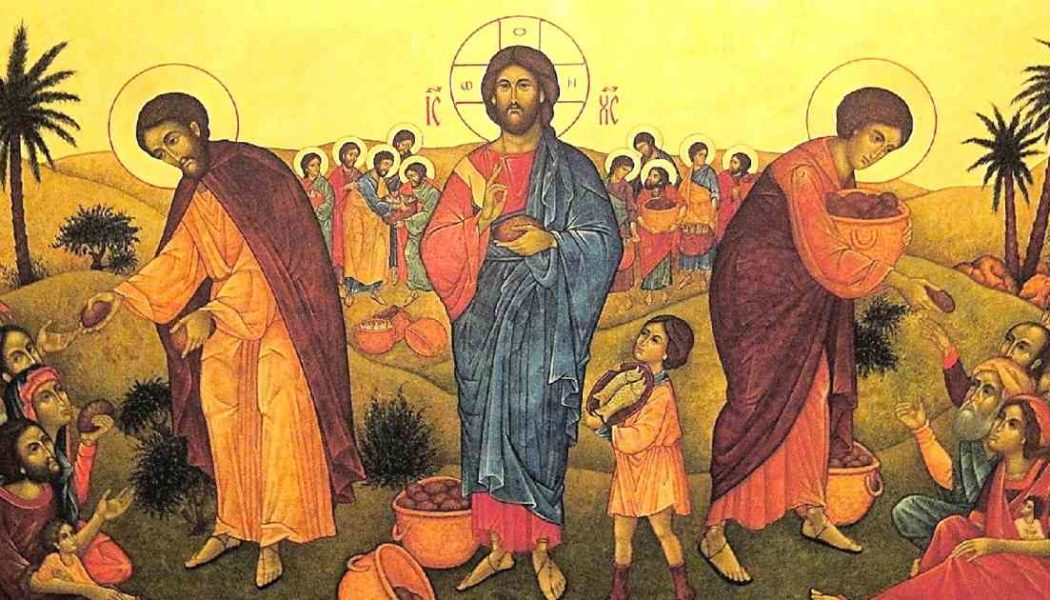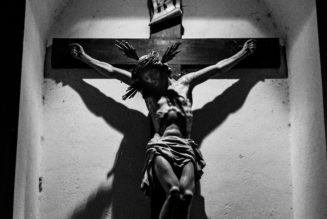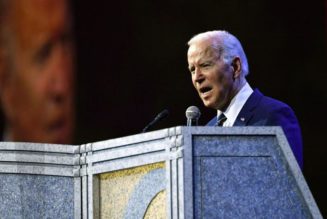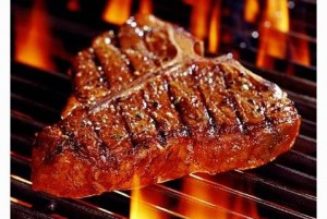The National Eucharistic Congress in Indianapolis July 17-21 is being called a turning point for the Church in the United States, much the way World Youth Day 1993 in Denver was for my generation.
But if you weren’t able to make it to those five days in Indianapolis, don’t worry: The most amazing thing that was there is also on offer in your parish this Sunday — Jesus Christ in the Blessed Sacrament, and his own words to guide us.
In the next five Sundays which are centered on the Gospel of John, Chapter 6, Jesus Christ himself will lead the whole Church in a Eucharistic Congress — including a big warning today about avoiding the common mistake we make at events like the National Eucharistic Congress.
This Sunday, Day One has a clear message: You get what you give — and lose what you grasp at.
The story of the multiplication of the loaves is that rare story from Jesus’s public ministry that is told in all four Gospels. Last week, we started the story with Mark, and it was much like the beginning of the National Eucharistic Congress.
As the successors to the apostles arrived in Indianapolis, they saw the long line of “sheep without a shepherd” outside the convention center. The Twelve found exactly the same thing two millennia ago. The Lord invited them to “come away by yourselves to a deserted place and rest awhile” and they discovered that this would not be a restful retreat, but an example of how they would belong to the people, now.
John picks up this week where Mark left off, saying, “Jesus went across the Sea of Galilee. A large crowd followed him.” John gives the further detail that “the Jewish feast of Passover was near.” In other words, the Lamb of God who came to sacrifice himself had redemption on his mind.
Seeing the large crowd, he asked Philip, “Where can we buy enough food for them to eat?”
Philip answered, “Two hundred days’ wages worth of food would not be enough for each of them to have a little.”
This is the world’s logic when it comes to what God wants to do. God asks us for a lot — and with merciless realism we point out to God that he simply can’t have what he wants.
He wants to transform America; we tell him there is no way. We would need to have the schools for that — but public schools won’t let us talk about him. Maybe the media could transform culture for him — but the media paints Christian practice as useless and Christian teachings on marriage and life as bigotry. Maybe political victories could help him — but now the platforms of both party platforms refuse to stand up for marriage and life. And maybe the corporate world could help him — but the corporate world agrees with the media and the politicians.
We are each Philip when we say, “God, I know you’re right. The world needs you. But look! Even if we did an impossibly immense amount of work, the culture would be barely affected.”
Enter the boy … enter us.
Then Andrew interrupts with what sounds like a non sequitur. He says to Jesus, “There is a boy here who has five barley loaves and two fish; but what good are these for so many?”
It’s the kind of logic only a child can believe. Children believe that the weeds they found on the way home are a beautiful bouquet for mom; they believe their drawing is a flattering portrait of dad; and they believe “People are hungry. I have food. Jesus can feed them all with this!”
But when Jesus says we should all be like children, this kind of innocent faith is part of what he means. Because, as it turns out, a loving bouquet of weed-flowers from a child does delight mom; a stick figure depiction of him does flatter dad; and Jesus really can transform what we give him to what the world needs.
I love two lines in particular from this Gospel. The first is: “Jesus took the loaves, gave thanks, and distributed them to those who were reclining, and also as much of the fish as they wanted.” I love that “as much as they wanted” part. This wasn’t a “we have only barely enough, so please hold back” situation. This was an “eat your fill; there’s plenty” opportunity.
The second verse I like is when Jesus asks them to gather up the leftovers. It says: “So they collected them, and filled twelve wicker baskets with fragments from the five barley loaves that had been more than they could eat.” Note that he said they collected “fragments from the five barley loaves.” They didn’t fill 12 baskets with new barely loves; they filled them with the original five loaves. And Jesus didn’t make leftovers; the original five barley loaves were themselves “more than they could eat.”
In other words, Jesus didn’t make new loaves: He fed everyone with only those original loaves.
The Church Father St. Hilary spelled out how crazy this is when he said: “The five loaves are not multiplied into more, but fragments take the place of fragments, the substance growing whether upon the tables or in the hands that took them up, I know not.”
St. Rabanus Maurus, a favorite of St. Thomas Aquinas, says Jesus “creates no new bread, but having taken what the disciples had, he gave thanks.”
I love how Frank Sheed in his book To Know Christ Jesus, calls this not the “multiplication” but the “multi-location of the loaves and fishes.” The idea is that what the food does is like bilocation, only with the same bread being in several places at once.
This is the first apologetics point in Jesus’s Eucharistic Congress.
In this lesson, he wants us to understand that he can be present in every tabernacle in the world, just as the five barley loaves were present in many hands and in 12 baskets representing the 12 tribes of Israel. And he wants us to see that this is possible because God takes the smallest acts of human generosity and subsumes them into his own supernatural generosity to transform them.
Jesus wants to feed his people, so when a boy offers his own lunch; God fills thousands of stomachs and 12 baskets with it. Jesus wants to feed us, also, so when priests offer hosts of bread, God fills hundreds of thousands of tabernacles worldwide.
It’s the same story throughout history. If we hold back, our sins of omission stop God’s progress. If we give him an inch, he takes a million miles.
You see it in the First Reading when there is a famine throughout the land and an out-of-towner steps forward to give what he has: 20 barley loaves. The naysayers say it will never be enough, but the prophet Elisha ignores the naysayers.
“Thus says the Lord, they shall eat and there shall be some left over,” he says, and the reading tells us “And when they had eaten, there was some left over, as the Lord had said.”
What does this mean in the lives of Catholics today? Well, at the end of the Gospel, we see an example of what it doesn’t mean.
If the National Eucharistic Congress stays at the level of feelings, it will fail.
John writes: “When the people saw the sign he had done, they said, ‘This is truly the Prophet, the one who is to come into the world.’ Since Jesus knew that they were going to come and carry him off to make him king, he withdrew again to the mountain alone.”
The people ate their fill and liked feeling full, so they decided, “Jesus is great because he makes me feel good.” When they decided to make him king, it wasn’t the king of their lives they were crowning; it was the king of their feelings. They were grasping on to the great experience he gave them, and all that did was make him slip through their fingers and withdraw, because that’s not why he came.
We know that the National Eucharistic Congress can lead people to seek feelings instead of personal reform because that’s exactly what happened in Jesus’s own Eucharistic Congress. We were hungry and he made us feel satisfied; we swayed to the music and finally felt full. But that’s not all that Jesus wants.
The Second Reading at Mass offers a counter-example in St. Paul. The feelings of unity that come from singing in unison with a crowd of people are powerful and good. But only our subsequent choices will make them become real unity of heart and mind with God, who is “One Lord, one faith, one baptism, one God and Father of all, who is over all and through all and in all.”
And the unity of emotions with each other as we sing together is thrilling, but God’s real goal is unity of wills with him when we are alone. As St Paul put it, from the darkness of a dungeon: “I, a prisoner for the Lord, urge you to live in a manner worthy of the call you have received, with all humility and gentleness, with patience, bearing with one another through love.”
The first thing we should do is invite someone, right away, to Sunday Mass. Jesus is our Eucharistic king who we meet at Mass each Sunday every bit as much as he was the Eucharistic king at the multiplication of the loaves, and at the Indianapolis Colts stadium. We receive everything from him on Sunday; he wants us to reciprocate by staying with him every day of the week and bringing someone new to church.
Be not afraid. We know that he will multiply whatever we do for him, and he will flee to the hills whenever we try to keep him all to ourselves.
Image: Jim Forest Flickr;
Sr. Patricia Reid, RSCJ








